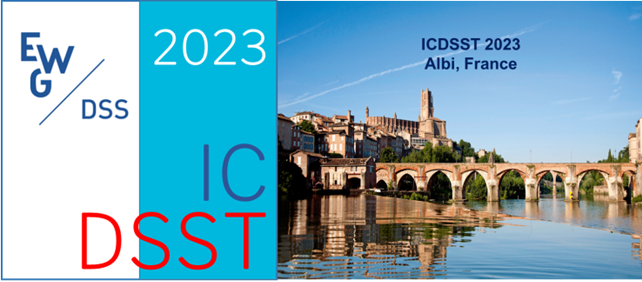COST Open Call Proposal
Reference: oc-2011-1-8874
”Decisions at the Internet Age”
(Preliminary Proposal)
Proposers Details:
- Prof. Pascale Zaraté, Professor at Toulouse 1 Capitole University, IRIT Laboratory, Toulouse, France. Email: zarate@irit.fr ;
- Dr. Fatima Dargam, Senior Researcher at SimTech, Graz, Austria, and at ILTC, Rio de Janeiro, Brazil. Email: f.dargam@simtechnology.com ;
- Dr. Rita Ribeiro, Senior Researcher at CA3, UNINOVA University, Lisbon, Portugal. Email: rar@uninova.pt .
Scientific Content
1. Proposal Title:
Decisions at the Internet Age (DATIA)
2. Abstract
This Action proposal aims at establishing and supporting a forum of excellence among Decision Science researchers to guide advanced research in the field of Decision Systems, currently developed by nationally-funded institutions of European COST member countries and worldwide, towards an innovative distributed interoperable Decision Systems paradigm for the Internet Age. This paradigm will deliver solutions for web-based decision-making by promoting the appropriate interaction of three key components: the ever-growing availability and changeability of data; the growing complexity and uncertainty of decision environments; as well as ubiquitous high-speed information flow. This way, it supports spatial-temporal decisions including collaborative decision-making. This Action’s main mission is to facilitate via the established network, highly qualified joint-research among its collaborators and promote the necessary process of technology transfer from Decision Sciences to industry.
3. Keywords
Collaborative Decision Systems; Spatial-temporal decision-making; Web-based Decision-Making; Web 2.0 Technologies & Resources; Web 3.0 Semantic Web.
4. Preferred COST Domain:
Information and Communication Technologies (ICT)
5. Text of Proposall
- BACKGROUND, PROBLEMS
The influence of Internet in our everyday life is very well known. The impact that Internet brings to our decisions is substantial, as confirmed by McRoberts’ in his study of 2010[1], which concentrated on both how the Internet informs and connects consumers; and the way it is currently driving decision-making. It shows an increasing perspective of the Internet influence on decision-making within the next two years in four major countries in the world, reaching the indexes of more 30% in Germany and 85% in China. This tendency cannot be ignored in future developments of Decision Support Systems (DSS).
Since late 90´s descriptive theories of decision-making were already documented as suffering critical violations when tested on the Internet. Currently, we still encounter critical problems when trying to use conventionally developed DSS on top of web platforms. In 2002, “Decision Support Systems in the Internet Age” was the central theme of an international conference (DSIAge2002), which identified the need to develop new approaches to decision-making and decision support in order to face the many changes brought by the Internet Age.
A major trend in decision-making for the past 20 years has been the migration from individual decision-making to collective decisions. This trend was followed by dynamic decision-making within spatial-temporal environments. Several changes of working conditions influenced these trends: geographical dispersion due to the business internationalization, concurrent work to satisfy time delays, fast and constant access to either new or updated information due to internet globalization, facilitation of the information sharing made possible by local area networks and Internet availability. These developments along with the intensification of Electronic Communication Tools have also tremendously increased the amount of information to be sorted out by decision-makers.
Research in decision-making can no longer be restricted to the traditional DSS perspective. Decision-makers are currently faced with a large number of information and the traditional cognitive decision-making process is nowadays much more complex.
Over the last years, several research projects and COST Actions referring directly or indirectly to Decision Sciences and Technologies have been funded, like: FP0804, Forest Management Decision Support Systems (Forest and Natural Resources Domain) ; IC0602, Algorithm Decision Theory (Information and Communication Technologies Domain); IC0702, Soft Computing and Statistical Methods for Data Analysis (ICT); IC0801, Agreement Technologies (ICT). This proposal will provide another course of actions in this network roadmap, which will open new avenues in Decision Systems research at the current Internet Age.
BENEFITS
A benefit from the proposed DATIA network, which is of concrete importance for the European research community, is that it will facilitate and promote research towards the specification of an innovative web-based collaborative decision-making paradigm. This benefit adds value to the area of Information Technology by complementing efforts of other networks, like Agreement Technologies; whereas it also adds value to the European ICT industry by presenting a new DSS framework for the Web 2.0/3.0 technologies to be considered for technology transfer and further development within an open source distributed software basis.
Another expected benefit that can be identified is the dissemination of interdisciplinary competences through qualified cross-joint-research production and continuing education, involving young researchers for sustained capacity building, within the existing European community of Decision Sciences and Technologies.
OBJECTIVES, DELIVERABLES AND EXPECTED SCIENTIFIC IMPACT
The main objective of this Action is to establish a network and support a forum of excellence among Decision Sciences researchers to guide advanced research towards an innovative distributed interoperable paradigm for Decision Systems for the Internet. Such a paradigm should be able to deliver solutions for web (2.0 / 3.0) based decision-making, by promoting the appropriate collaborative interaction of the ever-growing availability of data and their increasingly complexity due to changeable environments, as well as high-speed information flow that supports both the spatial-temporal decisions and the decision-makers.
DETAILED OBJECTIVES
- Facilitate and promote state-of-the-art joint and interdisciplinary research among the Action partners and collaborators, which tackle the various issues of Web-based Spatial-temporal Decision Systems, Technologies and Resources. This mid-term goal aims at a comprehensive and robust understanding of the requirements for new decision support architectures and methodologies for specifying dynamic and collaborative DSS for the Web 2.0 and 3.0.
- Establish a highly collaborative research network within the Decision-Making research community in Europe, so that the involved scientists and their worldwide collaborators are able to disseminate their research, via the various planned activities, workshops and meetings.
- Enforce the research interaction within the related areas by: Promoting cross-educational capacities via academic visits and inter-institutional seminars and workshops; Facilitating young researchers’ integration and enforcing gender balance activities within the Decision Sciences community; Promoting summer schools as seeds for new doctoral studies, aiming at the sustained education of young researchers.
- Consolidate among the research community the urgent need for a roadmap towards the specification of innovative and adequate web-based spatial-temporal decision-making collaborative tools and systems; as well as to bring this awareness into the ICT industry and services for further development and by suggesting application domains and indicating case-studies for testing and benchmarking.
DELIVERABLES
- Online interactive documentation of the Action evolution with the creation of a Web-log (Blog), dedicated to the interaction of all Action collaborators, assuring transparency of the interaction flow.
- A DATIA-Wiki to allow interaction within a rapid and transparent working space using Wiki-documents. This way, the updates of jointly-produced documentation are easy to perceive and to be fine-tuned within the whole cooperation process.
- Joint-publications; multidisciplinary cross-edition of proceedings of the planned workshops, forums and meetings; jointly-supervised thesis; joint-teaching cooperations; and a Book that compiles the studies carried out by the DATIA working groups towards the web-based DSS paradigm.
EXPECTED SCIENTIFIC IMPACT
The main impact of this proposal comes with the investigation of adequate approaches for creating modern decision-making tools, so that we can provide decision-makers with the collaborative solutions they need, within their common working environment: the Internet.
The expected scientific impact is to have the concept of a traceable decision-making solution for interactions specified, in which cross-information, opinions, knowledge and decision power reside side by side along with their temporal records. This impact builds on top of one of the biggest impacts of the Internet Age, also consolidated with Web 2.0 and its Social Networks platforms, which brought the capability of high collaborative speed in joint projects.
SCIENTIFIC PROGRAMME AND INNOVATION
The DATIA network will follow a scientific programme, structured by several activities that will promote and disseminate the studies and interaction results of the four Action Working Groups (WGs):
- WG 1: DM Methodologies within GDSS
- WG 2: DM using Social Networks and Web Resources
- WG 3: Spatial-temporal Web-based DM
- WG 4: Technical, Legal & Social Aspects of Web-based DM
WG1 will explore methods of GDSS in order to better promote collaboration among decision-makers using web-based platforms. WG2 shall explore the characteristics of social networks and Web 2.0 and 3.0 towards a novel decision-making model supporting the reconstruction of decision processes. WG3 shall concentrate on the study of the dynamic and spatial-temporal characteristics of web-based decision-making. And WG4 will focus on analyzing the platform in its technical, legal and social aspects. It is expected that WG4 brings together Human and Social Sciences scientists in order to discuss about protocols of case-studies for real-life situations and their implications.
Each WG will: Organize two annual meetings or workshops and publish its relative report or proceedings; Disseminate its interdisciplinary competence within at least one annual conference in the area of Decision Sciences; Produce an annual state-of-the-art report of its advances within its main topic; Promote initiatives and one-day events, like forums and seminars, to encourage the participation of young researchers and PhD students in the WG; Encourage cross-visits among WG participants to better disseminate the WG theme; and encourage new PhD and Master Thesis on its theme.
ORGANISATION
The DATIA network initially counts with 21 interested European participants. Most of them come from two existing working groups: the EURO Working on Decision Support Systems – EWG-DSS (see http://www.euro-oline.org) founded in 1989 and the IFIP TC8/WG8.3 group on DSS. The proposers of this Action cooperate in DSS research within the EWG-DSS for 22 years, as founding members and since 2007 as group coordinators.
Those DSS working groups will provide DATIA with a consolidated background on their expertise areas. Thus, complementing this COST Action to successfully promote an augmented network within European countries and worldwide to tackle the open and missing issues within Decision-Making at the Internet Age.
6. Participants interested in the DATIA Network:
1. Pascale Zaraté – France – <zarate@irit.fr>
2. Fatima Dargam – Austria – <F.Dargam@SimTechnology.com>
3. Rita Ribeiro – Portugal – <rar@uninova.pt>
4. Shaofeng Liu – UK – <shaofeng.liu@plymouth.ac.uk>
5. Jorge Hernández – UK – <J.E.Hernandez@liverpool.ac.uk>
6. Boris Delibasic – Serbia – <delibasicboris@gmail.com>
7. Jason Papathanasiou – Greece – <jasonp@uom.gr>
8. Jacques Calmet – Germany – <calmet@ira.uka.de>
9. Gabriela Florescu – Romania – <gflores@ici.ro>
10. Mihaela Dinsoreanu – Romania – <mihaela.dinsoreanu@cs.utcluj.ro>
11. José María Moreno – Spain – <moreno@unizar.es>
12. Stanislaw Stanek – Poland – <stanek@ae.katowice.pl>
13. Marko Bohanec- Slovenia – <marko.bohanec@ijs.si>
14. Adrian Curaj – Romania – <adrian.curaj@uefiscsu.ro>
15. Marius Nicolaescu – Romania – <marius.nicolaescu@uefiscsu.ro>
16. Dan Grosu – Romania – <dan.grosu.08@gmail.com>
17. João Paulo Costa – Portugal – <jpaulo@fe.uc.pt>
18. Francisco Antunes – Portugal – <francisco.antunes@ubi.pt>
19. Oscar de Bruijn – UK – <Oscar.DeBruijn@mbs.ac.uk>
20. Boris Yatsalo – Russian (non-EU) – <yatsalo@obninsk.ru>
21. Isabella Linden – Belgium – <isabelle.linden@fundp.ac.be>




